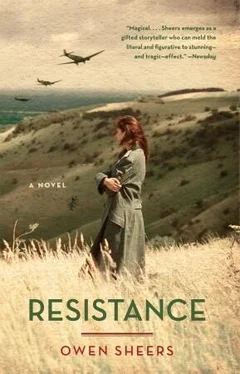As the pony picked its way along the narrow sheep tracks through the bracken, Sarah scanned the ground on either side of her, checking for sick ewes. A healthy sheep will graze with the flock but a sick one would often break away to lie on its own. The bracken was still thick at this time of year despite the hints of rust on the stems and edges of the leaves. You could pass a ewe by a couple of feet and still not know it was there. Even Tom often found them too late, when it was just the squawking of crows fighting with a buzzard that eventually led him to the carcass, already thick with maggots.
She wondered what else she should be looking for. This was Tom’s job. This is what he did when not seeing to the lower fields. Tend and guide the flock through its annual cycle of tupping, lambing, weaning, shearing, dipping. At least they’d be staying on the upland for a few more weeks. But then the lambing ewes would need to be brought down to the meadows for flushing. It seemed impossible to Sarah that Tom wouldn’t be back by then, but what would she do if he wasn’t? She’d often watched him work the dogs, but she’d never worked them herself. With him they’d lie on either side of him, ears cocked, ready to move on his slightest instruction. Sometimes he didn’t even have to speak; the timbre of an intake of breath was enough for them to know the command he was about to give. A nod, the slightest of sounds in the back of his throat. Then, as they fanned out on either side of him, still bodies over their quick legs, he’d switch to a palette of whistles, playing the dogs at a distance as if they were tethered to his fingers by invisible lengths of string. And they were good dogs too. Even William had to admit that. Never drove the flock too fast. Could bring them all the way off the mountain just by standing, poised, in the exact positions where Tom placed them. How could she ever hope to replicate that? With her the dogs associated the hill with rides like this, or when she went picking bilberries, when they could loop out and back to her in a loose pattern of coming and going. With Tom the hill was their place of work, a tight map of pressure and release, of give and take as the flock flowed before them like a shoal, three hundred animals moving as one.
The pony worked hard against the slope beneath her and as she leant forward on its withers she felt its shoulder muscles slipping over the bone. They came out of the bracken and the land levelled off into the mosaic of moorland and heathland of the hilltop. The last high clouds had dissolved, leaving the sky a deep evening blue. To her left the Black Mountains ranged out into the distance, buckled and shadowed, the coarse wire grass, still bleached from the summer, catching the unhindered low sun. As she rode on the view on the other side of the Black Hill revealed itself from under the ridge. A wide expanse of undulating fields, crossed and divided by hedges, punctuated by houses and hamlets, stretching out far below her, as if viewed from a low-flying aeroplane. She’d lived here for four years and yet it still managed to catch her unawares, somewhere under the ribs, every time. This contrast, from the claustrophobic view of the valley, its steep walls framing the sky, bringing your head back all the time, to this: an entire country laid out before her, tangible, open, and yet so out of reach.
But Tom wasn’t down there, she was sure of it. He was a hill man. They all were. She remembered one of the diagrams she’d glimpsed in “The Countryman’s Diary.” A cross section of a deep underground burrow stocked with supplies, rudimentary bunk beds, a thin tunnel leading horizontally from one end, another leading up vertically from the other. A disguised entrance covered with grass and leaves. She looked back over the moorland behind her again. It was bare and massive, shot with spring flushes and pitted with dark pools filling the peaty hollows. Maybe they were here, right now, under that sparse, empty ground. Maybe they could hear Bess’s hooves above them. Maybe they could even see her. An electric thrill ran through her at the thought of Tom emerging from that tuft of deergrass there, or from under those bushes of heather. Still half turned on the back of the pony, she shouted his name to the hill again.
“Tom!”
She listened but again there was nothing. Just the wind, hushing and rushing in her ears, rising and falling like her own blood, like distant waves, endlessly folding against a stubbornly silent shore.
That night Sarah tried to sleep with the dogs in the bedroom, but it was no good. Tom rarely let them into the house, let alone upstairs. They turned and whined at the side of her bed, their claws scraping on the wooden floor until Sarah took them back outside and chained them in the yard. She returned to the bedroom alone, a single candle lighting her way up the narrow staircase. Getting under the heavy layers of blankets, she stretched her hand across the sheet to feel for the impression of Tom once more. He was still there, just, but growing fainter all the time. The mattress was expanding back into his shape, like water seeping into those hollows on the hill, steadily rising up the banks until there was no hollow, just an undisturbed surface reflecting the blankness of a cloud-covered sky.

It was around midnight, suspended somewhere between sleep and wakefulness, that the thought came to her. If Tom was going to be away, then she wanted him to know she’d managed the farm without him; that everything was ready for him to carry on as usual when he came back. What she’d done each day, how many animals were ill when, how many eggs, how many lambs even, if he was away that long. She’d write it all in the back of the accounts book they kept in the dresser downstairs. She would write it every day so that when he returned he could read it. And once he had, he’d know how she’d spent these weeks without him. He’d know everything, just as if they’d never been apart at all.
The first frost this morning. We didn’t expect that .
Fed the pullets warm mash and gave some to the pig too. Three of the pullets laid today. Only one hen still laying .
Helped Menna Probert pull Hywel’s field of mangels. Menna and me pulled and docked. Bethan did the cart and Mary loaded. Maggie looked after Menna’s two .
Gone five when we finished .
Took Bess around the flock. The cut above her fore off knee is healing good .
Drove a batch of ewes off the heavy grazing on the top marsh .
Maggie came and we made supper here. Still no news from her wireless today .
Maggie said she’ll take eggs and cheese into market tomorrow .
The leaves are turning fast. The birch is all yellow and the sycamore is browning. I saw a thrush this morning, hammering a snail shell on the wall. That tawny owl is back, calling all through the night .
The pen felt awkward in Sarah’s hand. Her fingers were stiff from picking and docking the mangels and it slipped in her grip. It felt too thin, too fragile. She’d been writing this diary every night for two weeks now, but she still wasn’t used to it. She hadn’t written like this since school. She’d always kept the accounts, but that was different. That was numbers, dates, lists of words. The money they got from an auction of lambs, the coins she spent in the village, the stuffed sacks of freshly sheared wool, they all translated onto the pages of the accounts book. The numbers and dates she wrote represented what happened. But this diary, written at the other end of the book, the other way up, was different. She still couldn’t make her days translate onto these pages. She looked at the words she’d just written. Helped Menna Probert pull Hywel’s field of mangels . That didn’t describe how they’d spent the day at all. How they’d gathered in Menna’s kitchen for a breakfast of oatmeal and tea before tramping down to Hywel’s lower meadow. How the valley was still dark in shadow as the cart trundled and bucked over the frost-hardened ruts behind them. How they’d started at the top of the field where the sun first touched and followed that line, that border of shadow, as it steadily moved down the slope. How they’d followed it all day, a couple of feet behind, giving it time to warm the mangels and soften the earth so the waterlogged roots wouldn’t bruise when they eased them from the soil. How Bethan didn’t speak to any of them yet whispered and coaxed the old cart horse all day, scratching at its withers, geeing it on with sharp clicks of her tongue against her teeth. How that early sun caught the frost on the ploughed ridges, transforming the crop into a field of diamonds. How when Menna cut her finger with the curved blade of the docking knife she’d cursed then laughed at herself right after, hand over her mouth, shocked at her own profanity. How the blood curled around her finger like a molten wedding ring. How this evening her own fingers are sore and cramped, how her back aches after hours of bending to pull at the mangels, shaking them free of the earth. How she never thought it would be for this long. How she wants Tom back. How she wants all of them back. How she wants it to be like before.
Читать дальше













